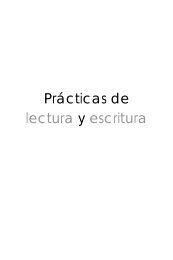blueprints
blueprints
blueprints
Create successful ePaper yourself
Turn your PDF publications into a flip-book with our unique Google optimized e-Paper software.
202 | toolkit: an idea, a pencil, and paper<br />
can probably help you develop one, especially if you have well-articulated<br />
values and goals. If you already know what you want to do, whether it’s<br />
library programming, recitations, readings, residencies, workshops, afterschool<br />
programs, or something else entirely, someone at your local arts<br />
agency will probably have ideas about how to get started. That person may<br />
also be able to help you with some practical issues, including providing<br />
contacts, giving you information about how to incorporate and become a<br />
nonprofit organization, and helping you think about funding. As early as<br />
possible in your planning, you should make contact with these people.<br />
You may not be able to precisely re-create the program or idea that<br />
originally drove you—or not at least right away. It may be that your experience<br />
came out of some large, national program or the opportunity to<br />
study abroad or an encounter with a Nobel laureate. But remember, as<br />
Susan Boskoff points out, that the experience of poetry, even when it comes<br />
in company, is intimate, the experience of one person speaking to another,<br />
creating an intimate space for that other to enter.<br />
Checklist: Identify Passions, Define Values, Create Goals<br />
A. With pen in hand, ask yourself these questions:<br />
1. What experiences led me to this juncture?<br />
2. If they involve my developing a passion for poetry, how did<br />
they do this?<br />
3. If they involve my sense of a need in the community for community<br />
building, how do I describe this need? Why and how<br />
do I think poetry might fill it?<br />
4. What do my passions tell me about my values?<br />
5. Why am I doing this—why me?<br />
6. What do I hope to achieve?<br />
B. If you began by asking these questions alone, continue by asking<br />
them in company, again taking notes.<br />
C. Together, you and your group members should compare experiences,<br />
passions, values, and goals. Find where they overlap, and decide<br />
which are most important.<br />
D. Relying on your previous experiences to guide you, imagine what<br />
kinds of programs might achieve your goals. Remember that a given<br />
program might fulfill more than one goal. For example, an afternoon<br />
reading series might give young people a place to go after school and<br />
also engage them in civic discourse or bring them together with







